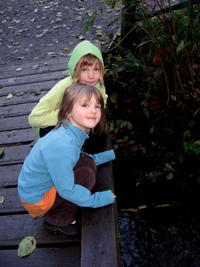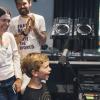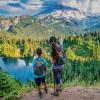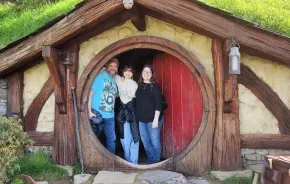Updated October, 2009
By now, we’ve all heard the news: Kids these days just don’t get outdoors enough. Tethered to their iPods and their cell phones, their schedules fitted jigsaw-tight with structured extracurriculars, they don’t have the time or inclination anymore for the type of unstructured outdoor noodling that earlier generations took for granted.
 “What I’m finding in the majority of the metropolitan area around Puget Sound is that most kids don’t have a strong connection to nature,” says Tom Murdoch, director of the Adopt-a-Stream Foundation in Everett. “When I was a little kid, I was pretty fortunate to … watch trout and salamanders, and got really connected to nature doing that. Most urban kids don’t have that opportunity unless their parents make the effort to take them out into a natural environment.”
“What I’m finding in the majority of the metropolitan area around Puget Sound is that most kids don’t have a strong connection to nature,” says Tom Murdoch, director of the Adopt-a-Stream Foundation in Everett. “When I was a little kid, I was pretty fortunate to … watch trout and salamanders, and got really connected to nature doing that. Most urban kids don’t have that opportunity unless their parents make the effort to take them out into a natural environment.”
That connection to the natural world is vital.
Several of the Puget Sound region’s parks and green spaces, most of them carved out of miles of surrounding urban concrete, are home to environmental education centers that act as a hub for exploration and education — building that connection. Some centers stock nature packs for families to take on hikes, others include nature displays or activities, and all of them offer classes for all ages that focus on wildlife, botany, conservation and other topics full of crunchy educational goodness.
This is a perfect time of year to visit, rain or no rain. “It’s a great time to decide that you’re going to get mucked up,” says Apryl Brinkley, site manager of the Mercer Slough Environmental Education Center in Bellevue. “To me, it’s one of the best times to get out.” If you give yourself over to a little rain, she adds, you can find animal signs everywhere, evidence that park critters are out and about amassing food for winter. Michele Cardinaux, program manager at Tacoma Nature Center, notes that the weather can be very good this time of year (here’s hoping!) and that falling leaves make migrating birds more easy to spot.
Messing around in streams and forests is fun, sure; it’s good exercise; and it does wonders for a child’s powers of observation. But there are other, more long-range reasons why it’s so important. For Murdoch, a child’s understanding of her environment and her place in it is crucial for future good stewardship of the land. Belinda Chin, education program supervisor at Seattle’s Carkeek Park, notes, “It’s about sense of place. The more that we learn about this place, the more that we learn how interconnected we are and what makes the Pacific Northwest so very special.”
Environmental education centers give Puget Sound parents a nudge in the right direction as they consider ways to involve their kids with the outdoors – without having to plan a backpacking trip to the North Cascades. Celese Spencer, a naturalist and cultural educator at the Cedar River Watershed Education Center in North Bend, notes that “Going to an environmental education center provides that bridge between the natural world and children’s minds.”
Environmental education centers
Northwest Stream Center, headquarters of Everett’s Adopt-a-Stream Foundation, doesn’t offer drop-in nature hikes and walks — yet. At the beautifully situated visitor’s center, which overlooks wetlands and is surrounded by the forest of adjacent McCollum Park, kids and adults can take classes taught by top-notch environmental educators. An outdoor trout stream exhibit, which will include a self-sustaining population of cutthroat trout and viewing windows into the pool habitat and spawning areas, is scheduled to be finished in early 2009. The foundation is also raising money (feel free to donate!) to build a wetlands boardwalk. Visit the Adopt-a-Stream Foundation or call 425-316-8592 for information on current programs.
Annie Morton, education director at Seward Park Environmental and Audubon Center in Seattle, observes, “A lot of people are surprised we’re here. People didn’t see this as a place to launch themselves out into the park.” The center, housed in a renovated vintage building and open since April 2008, now offers a full slate of nature-oriented walks, classes and workshops that make use of its gorgeous surroundings. Pop into the center to pick up a rental family pack (containing binoculars, bird books and checklists) to help you spot migratory birds and the ground-dwelling towhee, and to meet the resident tortoise, Lumpy. “He’s a fabulous way to make the day more exciting,” Morton says. The center is calling this month “arty October,” and it will be offering art workshops for kids and a storytelling session. Visit the Seward Park Environmental and Audubon Center Web site to take a look at the calendar.
 Carkeek Park’s claim to fame is its yearly salmon run. Chum salmon start running Piper’s Creek around Halloween and stick around through November. During salmon season, volunteers on weekend duty point out fish and talk to kids about the salmon’s life cycle. Piper Orchard, established by the pioneering Piper family, is a short, easy trail walk from the first parking lot on the left as you enter the park. Bring a bag with you — by October, many of the orchard’s apples will have dropped, and the park is requesting that the public collect windfall apples to help avoid pest infestation. The “Nature Play”–themed walk series for kids ages 2–5 is scheduled through December; drop by the environmental education center to pick up a brochure or download one at the Carkeek Park Web site.
Carkeek Park’s claim to fame is its yearly salmon run. Chum salmon start running Piper’s Creek around Halloween and stick around through November. During salmon season, volunteers on weekend duty point out fish and talk to kids about the salmon’s life cycle. Piper Orchard, established by the pioneering Piper family, is a short, easy trail walk from the first parking lot on the left as you enter the park. Bring a bag with you — by October, many of the orchard’s apples will have dropped, and the park is requesting that the public collect windfall apples to help avoid pest infestation. The “Nature Play”–themed walk series for kids ages 2–5 is scheduled through December; drop by the environmental education center to pick up a brochure or download one at the Carkeek Park Web site.
The Cedar River Watershed Education Center boasts a view of Rattlesnake Lake and a unique sound sculpture in the native plant garden. Stop by before a hike to the lake and pick up one of the new discovery packs containing guides, maps, binoculars, hand lenses and other items to help kids explore area plants and wildlife along the trail. “All year long you can find really dramatic things along the trails,” notes Celese Spencer. “Boreal toads are a possibility — the young ones are migrating right now through the forest, you so you have to watch your step. And certainly a tremendous amount of signs of wildlife.” Inside the education center, spend some time in the “Water is Magic” exhibit, which traces the water cycle. “Our job out here is to connect people to the water supply, to where their water comes from, and why it’s so important to take care of that,” Spencer says. Visit the Cedar River Watershed Education Center site for directions and program information, or call 206-733-9421.
Mercer Slough, home to wildlife that includes coyotes, muskrat, beavers and great blue herons, is a gorgeous in-city wetland that’s easily accessible to families with small kids. Mercer Slough Environmental Education Center’s new facilities opened to the public on Oct. 11, 2008 with hikes for kids and adults, classroom workshops, and lectures from 10 a.m.–5 p.m. The much-anticipated new center’s small, airy buildings are integrated into the site, and include a tree house and slough outlook. “You can see the Bellevue skyline, the nature park, the sunset, birds. It really is a very cool feature,” Apryl Brinkley says. Pacific Science Center provides environmental education programs while the city of Bellevue runs ranger interpretive programs. The new facilities mean that the education center will be able to offer enhanced programming and reach more people. Visit the Pacific Science Center site for information about current programs.
The Tacoma Nature Center is another place you’ll find wetlands preserved right in the middle of the city. Trails across the center’s 70 acres are flat and easy enough for kids of any age. “Families with young children can make it down to our most special places very easily,” says program manager Michele Cardinaux. “The first bridge is the best spot for seeing birds and turtles.” Preschoolers can attend “Nature Alphabet” story and craft times; the nature center also offers walks and events in conjunction with the Adriana Hess Audubon Center in University Place and Morse Wildlife Preserve in Graham. Visit Metro Parks Tacoma for class information, or call 253-591-6439.
Other environmental education centers
The Discovery Park Visitor Center in Seattle, housed in an airy building with a paved courtyard out back, contains tot-high wildlife displays and a large, nature-themed playroom. Find trail maps and information about the park’s numerous classes here — fall bird tours run through November — or visit the Discovery Park Web site.
Camp Long’s WPA-era lodge houses a wildlife display and information on accessing the unique West Seattle park, which boasts rustic (very, very rustic) cabins for camping and a rock wall to climb. Pick up a catalog that lists nature programs at the park — or download one at the Camp Long site.
Lewis Creek Park Visitor Center in Bellevue offers interpretive walks and classes for all ages through wooded, 55-acre Lewis Creek Park. The Lewis Creek Park Family Discovery Series features fall-themed walks and workshops for all ages. For class information and registration, visit the Lewis Creek Park site.
This article originally appeared in the October, 2008 issue of ParentMap.
Kris Collingridge is ParentMap's Out & About editor.











